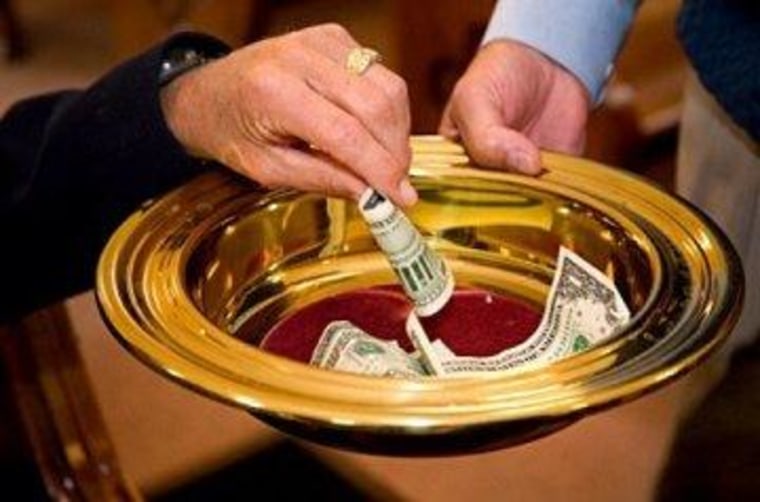First up from the God Machine this week is a provocative debate over houses of worship and tax policy.
Throughout the United States, churches, synagogues, mosques, and temples are considered tax-exempt entities, and the rationale has always been the same: because houses of worship are considered to be charitable institutions, without profit-making goals, government has always given them a pass on any kind of tax burden.
Matt Yglesias raised a few eyebrows this week, arguing that it's time to treat houses of worship like every other tax-eligible entity, which in turn raised a related question: just how much money is at stake?
Researchers at the University of Tampa set out to quantify the answer, and Dylan Matthews summarized the findings.
When people donate to religious groups, it's tax-deductible. Churches don't pay property taxes on their land or buildings. When they buy stuff, they don't pay sales taxes. When they sell stuff at a profit, they don't pay capital gains tax. If they spend less than they take in, they don't pay corporate income taxes. Priests, ministers, rabbis and the like get "parsonage exemptions" that let them deduct mortgage payments, rent and other living expenses when they're doing their income taxes. They also are the only group allowed to opt out of Social Security taxes (and benefits).
So, how much money are we talking about here? The University of Tampa research puts the total at $71 billion, which is obviously an enormous chunk of change. Note, however, that it's on the low end of possible estimates -- as Matthews explained, the figure doesn't include local income and property tax exemptions, or charitable deductions worth additional tens of billions of dollars.
The appetite among policymakers for any kind of changes in this area is practically non-existent, even as a simmering debate over tax reform and a reevaluation of deductions unfolds behind closed doors on Capitol Hill. But given the sheer number of houses of worship, the amount of property they own, and the apparent interest in moving governmental budgets closer to balance, this would, at a minimum, be the basis for an interesting public conversation.
Also from the God Machine this week:
* The Arkansas Christian Academy near Little Rock this week posted signs notifying the public that school staff is now armed. One sign in particular warns, "Any attempt to harm children will be met with deadly force."
* The Ridgedale Church of Christ in Tennessee forced Linda Cooper out of the congregation recently, despite her family's membership in the church for the last six decades. Her transgression? She sat with her gay daughter, a local police detective, at an event on same-sex benefits for the local police department.
* BuzzFeed this week published a series of interesting maps, offering a visual breakdown of Congress' religious makeup (thanks to reader R.P. for the tip).
* Given the importance the religious right movement places on a sense of victimization, Amanda Marcotte this week highlighted the "five most absurd, self-pitying gripes of the Christian right."
* And on a related note, the American Family Association's Bryan Fischer was outraged this week about a New Mexico court ruling that said a wedding photographer couldn't discriminate against a same-sex couple. According to Fischer, this means the courts "have turned Christians into Dred Scott." He added, "[T]o me this looks like Jim Crow is alive and well, we've got Jim Crow laws right back in operation, Christians are the new blacks."
